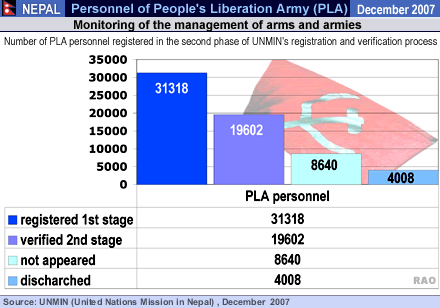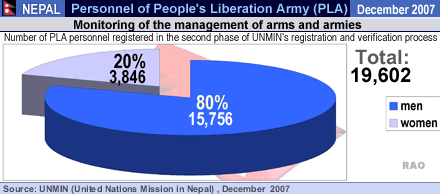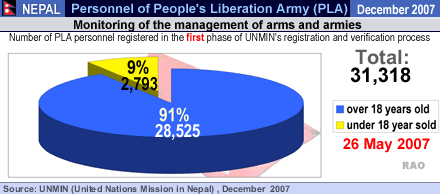|
I
will not refer to the two aspects of the agreement which have commanded
most attention - the commitment to a federal democratic republic and the
modification of the electoral system - because these are matters on which
I have always made clear that it would not be appropriate for the United
Nations to advocate a position. Suffice it to say that I am hopeful that
the compromises reached will lead to a timely and credible election for
a Constituent Assembly that the country has been waiting for.
Since
so many of the commitments in the new agreement have been made before,
I attach particular importance to the agreement to form within a month
a high level committee for monitoring the effective implementation of the
Comprehensive Peace Agreement and other agreements. I also believe that
the commitment to create local bodies by agreement is of crucial importance
to establishing conditions of public security in the districts and villages,
essential for the election. The importance that the Secretary-General and
UNMIN have always attached to dialogue with and inclusion of traditionally
marginalized groups is more relevant than ever. Their representatives have
repeatedly stressed that they have the greatest interest in the election
of a Constituent Assembly. I believe there is now an opportunity to ensure,
through dialogue with these groups, the establishment of a truly representative
Constituent Assembly where they will be properly represented and which
is necessary for the restructuring of the state which they seek.
top
|
UNMIN's
monitoring of the management of arms and armies |
 |
The
agreement promises progress on matters linked to UNMIN's monitoring of
the management of arms and armies:
release
of payments to Maoist combatants, discharge of those disqualified in verification
by UNMIN, and deliberations in the special committee to consider the supervision,
integration and rehabilitation of the Maoist combatants.
 |
|
Statement
by Ian Martin |
 |
Ian
Martin: The verification process was a difficult one, requiring thousands
of individual interviews, and it was a rigorous one. UNMIN arms monitors,
a professional military physician, UNICEF and UNDP experts were all part
of the verification teams, and the interviews they conducted with Maoist
personnel were extensive when they needed to be in order to make their
decisions. |
|
Since
UNMIN completed its verification, I have met with Chairman Prachanda and
Peace Minister Ram Chandra Poudel to discuss our cooperation regarding
discharge, and I have now sent to the two sides a report on UNMIN's monitoring
of arms and armies, including the final report on verification. This report
will be discussed in the Joint Monitoring Coordination Committee before
we make it public, but in the meantime I will give you the key figures:
 |
The
corrected number of personnel registered
in the first phase was 31,318.
18,923
of these personnel were verified in the second phase as members of the
Maoist army. |
 |
An
additional 932 persons who had not been
registered in the first phase were presented
for the verification process in the second phase. 679
of this total were verified as members of the Maoist army. |
 |
8,640
personnel did not appear for verification
interviews in the second phase and were automatically disqualified. |
 |
4,008
persons remain to be discharged from cantonments
after the total of absentees has been taken into account. |
 |
2,973 of this total were assessed to be under
the age of 18 on 25 May 2006. |
 |
The
full total verified as members of the Maoist army is thus 19,602,
comprising 15,756
men and 3,846 women. |
|
 |
|
|
|
Statement
by Ian Martin |
 |
Question: Regarding the 8,641 who did not attend the second phase of verification.
Do you have any idea, among them, how many have been involved in the YCL?
Ian
Martin: We don't know. I mean, frankly, we have a little information
as to where those people are at the moment. Certainly some of the child
protection agencies have come across some of them back in their own communities.
It may indeed be that some are now active in the YCL in their own communities
or elsewhere. But we simply don't have that information. |
|
The
verification process was a difficult one, requiring thousands of individual
interviews, and it was a rigorous one. UNMIN arms monitors, a professional
military physician, UNICEF and UNDP experts were all part of the verification
teams, and the interviews they conducted with Maoist personnel were extensive
when they needed to be in order to make their decisions. I am proud of
the work they did in executing a very demanding task - much of it during
difficult monsoon conditions. And I express appreciation of the good cooperation
received from the Maoist army once initial difficulties had been resolved.
 |
|
Statement
by Ian Martin |
 |
Ian
Martin: UNMIN was not mandated to supervise the cantonments. UNMIN
was mandated to monitor the management of arms and armies. The PLA commanders
are exercising their responsibility to keep control of the movements of
their personnel, including records as to when people are authorised to
go on leave and return. |
|
top
|
Mandate
of UNMIN |
 |
As
some of you have reported, the Government has now written formally to the
Secretary-General requesting an extension of the duration of the mandate
of UNMIN for a further six months. The Secretary-General has sent the letter
to the Security Council and will be presenting to them his own report and
recommendations, which we expect to be considered by the Council before
UNMIN's current mandate expires on 23 January 2008.
In
signing the 23-point agreement, the parties have rightly acknowledged that
the burden is now on implementation of commitments - to the election to
which they have committed themselves, to dialogue, and to transforming
existing agreements from rhetoric to reality. As the Secretary-General
says in his statement, the United Nations stands ready to extend all necessary
assistance.
Source:
UNMIN , December 2007 |
 |
top
 |
 |
External
links |
top

|





